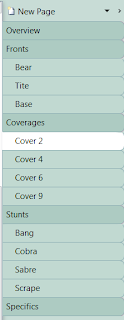A while back I was going through a bit of a crisis of faith, at least in the football context. I was having a real hard time coaching my position the way that our HC wanted me to do it, which felt exceedingly negative and overall-dick-ish. I'm pretty good a putting on a façade/war face in most situations, but my problem was that I'm very fond of the two kids that we had starting at ILB. One played for me for four years, the other is a hard-working, charming, tough kid that I'd coached in a limited role as a freshman and almost started for me as a sophomore. I had a hard time doing what, to me, consisted of constantly running them down. I don't like being negative in that fashion, I prefer to coach and treat people differently.
This resulted in a lot of conflicts with me and the HC, some internal and some external. I got yelled at, a lot. It wasn't uncommon for me to a tongue-lashing in practice at least once a week. Eventually, I got assigned to coach the OLBs and another coach took over the ILBs, which upset me and both of the starters a great deal. I took it in stride, but I became pretty resolved to find a different way to do things. I wanted to find examples from anyone I could that would show me how I can be a positive coach and still be a winner. So, a shopping spree at Amazon resulted in several books by or about John Wooden, John Gagliardi (more on both at another date), and Whale Done! By Ken Blanchard.
http://www.amazon.com/Whale-Done-Power-Positive-Relationships/dp/074323538X/ref=sr_1_1?ie=UTF8&qid=1292960129&sr=8-1
Whales? WTF?
Yep. Whales. Blanchard uses the example set by the whale trainers at SeaWorld to lay out his philosophy of positive training. In a nutshell, the philosophy is this: by emphasizing the positive, ignoring the negative, and redirecting the rest, we can build positive relationships with our subordinates and loved ones that enable us to experience a better way of being.
An example he uses is the difference between training a Jack Russell terrier in your yard and a Killer Whale in a tank. If you Jack Russell pees on your shoe, the common reaction is to shout and holler and make sure he knows that peeing on your shoe is BAD. He may never pee on your shoe again, but that hasn't limited him from peeing on the rugs, the couch, your laundry hamper, any number of things. If he nips your kid's heel, you whack him on the nose with the newspaper. So on and so on, training a dog isn't terribly complex in the grand scheme of things.
A Killer Whale, however, is a different task altogether. The whale is a beast of tremendous power and a fantastic killing machine. We can't just smack the whale on the nose when it's doing something we don't like. So, we have to go another way. We ignore negative behaviors and focus on encouraging and supporting positive behaviors. If we want the whale to jump out of the water and over a rope, we have to slowly train him. It starts with putting the rope in the water and giving him a rub on the head whenever he goes over the rope. He associates the head rub with going over the rope and keeps doing it. Then you start raising the rope out of the water. Mingle in feeding him some mackerel, more positive energy, and lots of effort, and you've got a friggin' whale jumping over a rope that's six feet out of the water! But if we had tried to use negative methodology, we'd probably have been marine mammal food in no time.
So… People?
Yep. People. I'm pretty committed to trying this out in certain aspects of my life: coaching track, teaching, training my parents new puppy. I really dig the theory and the methodology. I'm still working on planning how to incorporate the whole deal into football, since football is such a complex environment. People like being told what they're doing or have done was good, they like being rewarded, and they like pleasing the other people in their lives. It's not terribly outrageous to presume that we would get results from accentuating the good in people.
The trickiest aspect, in my mind, will be the ignoring of the negatives that people put out. It's one thing to accentuate the positive, that's fun and easy. But to ignore the negative efforts or actions of others is really, really hard. Imagine your two kids come in from outside and one tracks mud all over the floor, which you just cleaned. First instinct? "Get off the carpet with those shoes!" Whale Done philosophy says a more useful reaction would be to look at the one who is taking their shoes off by the doorway and say, "I love how you're minding the clean floor, go ahead and grab some couch time with the remote for a bit." You've accentuated what's positive about their behavior, you've rewarded it, and you've made it expressly clear to the other kid want kind of behavior you want without attacking them. Good stuff, right?
One Caveat, Though…
The ideas are great. The writing, however, is kinda painful. It reminds me of a philosophy book that I had to read for a class in college where a group of 'college students' seemingly had a series of debates about the nature of 'knowing', just for the hell of it. It all just felt forced and annoying to read, I hated the book and it was a terrible intro to philosophy for me. This book is the same thing. Lo and behold, a perfectly crafted story just happens to appear that reinforces exactly what the author is talking about. It's not like reading Twilight or anything, but it got to me.
















